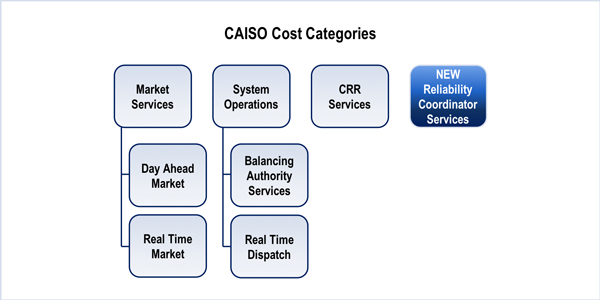By Robert Mullin
CAISO projects it will cost as much as $18.5 million to provide reliability coordinator (RC) services to areas outside its balancing authority, up from an estimate of $12.5 million in its original straw proposal.
The projected head count for the ISO’s RC services also jumped from 31 to 36 full-time employees — and from 50 to 55 full-time equivalents, including contributions from staff in other ISO divisions. The RC program would represent its own cost category within the ISO, alongside system operations, market services and congestion revenue rights services, but some functions would overlap.
By comparison, Peak Reliability, the Western Interconnection’s current RC, had a $45 million budget for 2018, which it said would fall to $31.2 million under a “transitional RC” plan, or $28.7 million if CAISO leaves the organization and all other funders remain. (See Peak Details Vision for ‘Transitional’ RC.)
CAISO attributed its increased estimates, in large part, to the high level of interest in its RC services. (See Most of West Signs up for CAISO RC Services.) The ISO plans to implement the RC program in its own balancing authority area in July 2019, followed by a rollout to other parts of the West starting two months later.
Under the $18.5 million scenario, 9% of CAISO’s $205 million in annual costs would be attributable to RC services, although those costs would be fully offset by fees paid by RC customers. The ISO estimates that RC customers will be charged 3 to 4 cents/MWh.
“This is a [financial] model including a significant portion on the Western Interconnection,” CAISO CFO Ryan Seghesio told stakeholders during a June 27 meeting to discuss the ISO’s draft final RC proposal. Seghesio noted the ISO has received letters of intent from a large share of the BAAs in the interconnection, while also acknowledging the nonbinding nature of those documents — and that some of the BAs have also submitted LOIs to SPP.
“If everybody in the Western Interconnection were to sign up for the ISO, would $18.5 million cover it?” asked Jim Shetler, general manager of the Balancing Authority of Northern California.
“This is the model, yes,” Seghesio said.
Getting the Rate Right
Deb Scott, senior attorney with Salt River Project, asked about the impact on the RC rate if CAISO attracts “less than a significant portion” of the interconnection to its RC services.
Seghesio explained that CAISO will file two different rate structures in its Tariff next year. The first will reflect the implementation of RC services for the existing CAISO footprint, which will not incur significant costs because the ISO already performs many of the reliability functions for its members.
But costs for the services will ramp up after the first non-CAISO members come on board, whether in September 2019 or later in the year, which will trigger use of the second higher-level cost structure for all RC customers, he said. The second structure will be scaled to align with the number of actual customers, so it may not hit the $18.5 million estimate.
Scott pressed for more details on how and when the RC rates would be set considering the uncertainty around the final customer base.
“FERC’s going to approve the rate design,” Seghesio said. “The actual rates won’t be determined until we do the revenue requirement each year, so when we get to the end of 2018, we’ll take the revenue requirement to the [CAISO Board of Governors] for approval, [and] that will kind of set this initial amount. By then we would have a better picture of what the service area will look like, and that will kind of set the rates.”
Gary Tarplee, principal adviser with Southern California Edison, asked whether CAISO’s 55-FTE estimate represents the top-end staffing requirement for an RC covering the full Western Interconnection, or if the number could exceed that.
“This is the full-cost model, whether it’s a significant portion or everybody, this model will work. We’re showing really what the highest cost would be,” Seghesio said.
He later clarified that the full-cost model is driven more by geographical diversity of the customer base than by its size.
“If we get some members in the Southwest and members in the Northwest, we really get to that full-cost model, because that determines the number of desks we really need,” Seghesio said. He said a larger customer base will reduce the rate “because you’re going to have more volume dividing into that $18.5 million.”
Billing Details
CAISO says it would levy a minimum $5,000 annual charge for RC customers with zero to low megawatt-hour volumes because they still require a “constant, although minimal, amount of attention.”
Seghesio also noted that, in response to stakeholder requests, the ISO is proposing to bill customers annually for services.
“The big push [among stakeholders] was not to go to a monthly process,” he said.
In cases of non-payment, the ISO would notify the rest of its RC customers of a pending default (and a potential supplemental bill), and inform the Western Electricity Coordinating Council and NERC.
“We would retain the ability to suspend the customer’s RC services, but we realize that would lead to reliability issues, so I think the plan is that we know we’re going to have to continue to provide reliability services for that entity so it doesn’t impact the overall reliability of the grid,” Seghesio said. “But we would notify WECC that we are no longer the RC of record for that entity.”
The ISO is proposing an 18-month initial commitment for new members to ensure recovery of integration costs, with a 12-month notice required for exiting after the initial period. The proposal calls for one annual onboarding and exit window each April.
CAISO plans to take its RC proposal to its board on July 25. It hopes to execute agreements with members by Nov. 15.





